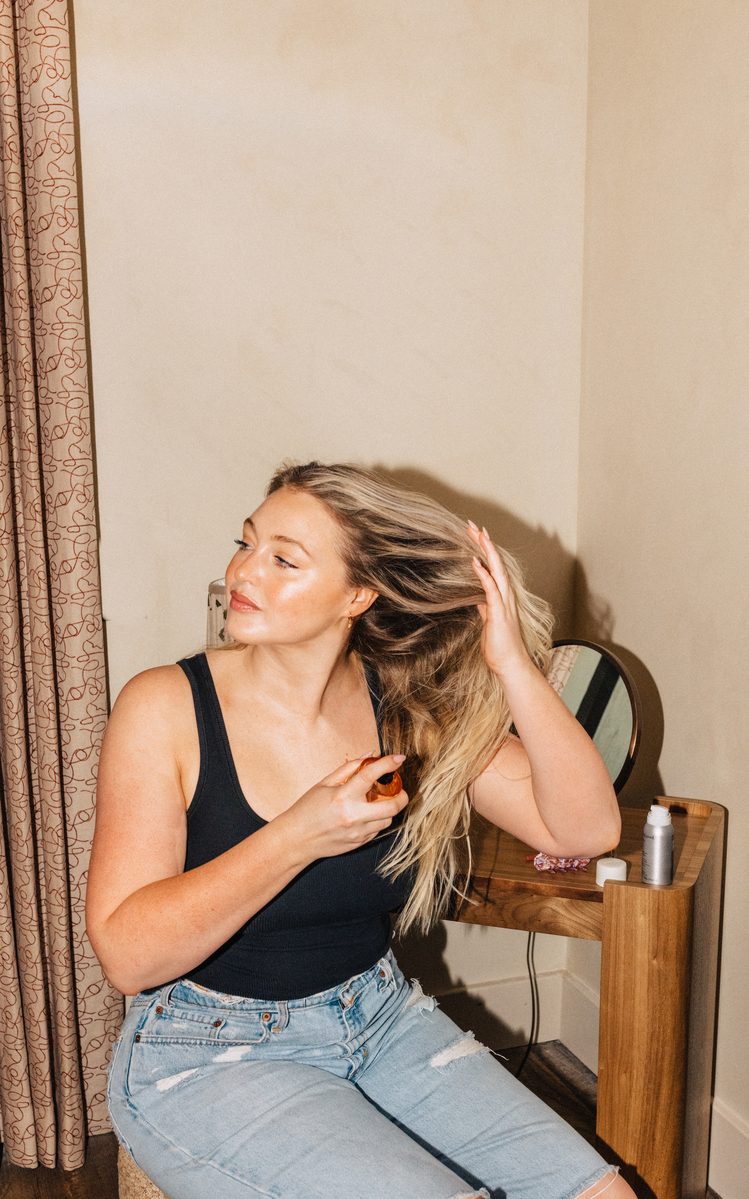
The world of beauty TikTok is vast and captivating. It can also be a veritable landmine of misinformation thanks to unchecked influencers. So when more and more TikTokers began showing off long glossy locks under the tag “rosemary water for hair” (to the tune of 32 million), we decided to dive deep into the trending treatment.
But first, let’s back up a bit. Last year, we broke down everything you needed to know about a similar viral beauty trend: rice water. Thanks to social media, the ancient ritual dating back to the Heian Period in Japan was gaining Gen Z fame, introducing millions to the vitamin B-rich wonders of starchy, leftover rice water.
Then, hair-fluencer Audrey Victoria posted a mesmerizing 10-second clip of her long, luscious locks declaring to her 2.3 million followers: “rosemary water is the new rice water.”
A challenger had emerged. But is there validity to the rosemary water for hair movement? We decided to investigate.
Featured image by Riley Reed.

Subscribe
Get the goods.
Gatherings, food, design, wellness, and more—it’s the newsletter you’ll actually want to read.
Thanks for Signing Up!
Oops!
Looks like you’re already signed up or your email address is invalid.
Oops!
Looks like you unsubscribed before click here to resubscribe.
Rosemary Water: Unpacking the Evidence
Unlike other TikTok-famous home remedies, there is actual evidence supporting the efficacy of rosemary water for hair growth. In a 2013 study examining how rosemary leaf extract can help with alopecia, it was found to inhibit testosterone from attacking hair follicles—a byproduct of the condition.
Another study comparing rosemary oil to minoxidil (Rogaine) found the two to be comparable, while those who used rosemary oil reported less scalp itching than those using minoxidil.
And finally, a 1998 study investigating the efficacy of aromatherapy oils on patchy hair loss found that, of those who rubbed rosemary and lavender oil into their hair every day for seven months, 44% saw an improvement in hair loss (compared to the 15 percent who used only carrier oils).
But it should be noted, the majority of studies were focused on the effects of rosemary oil, not rosemary water—though the two do share the same key ingredient.
“Usually, for active ingredients, oil-soluble ones are better than water-soluble ones for efficacy,” cosmetic chemist Ginger King explains to Allure.
Is rosemary water for hair growth worth the hype?
The major consensus seems to be, in terms of hair growth, a vial of regular old rosemary oil is more likely to give you results than rosemary water or tea. Just prepare to be patient—nothing grows overnight, and most of our cited professional studies took place over several months.
But there’s nothing intrinsically bad about boiling a few rosemary sprigs, pouring the water into a spray bottle, and spritzing your scalp from time to time. Rosemary’s antimicrobial properties can help reduce dandruff and improve scalp health, which is key for strong, healthy hair. Plus, rosemary water for hair surely smells lovely—far better than rice water tends to smell over time.
There are a handful of great rosemary oil-infused products, including Kiehl’s Magic Elixir and Aromatica’s Rosemary Root Enhancer (which even comes in a spray bottle), but if you’re set on trying a more DIY method, consider an oil-based concoction.
Below, Taylor Rose, one of the strongest voices in the rosemary water for hair TikTok space, shares a rosemary oil recipe.

